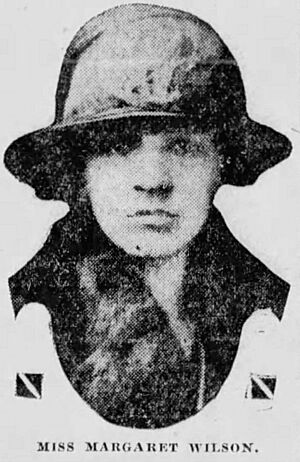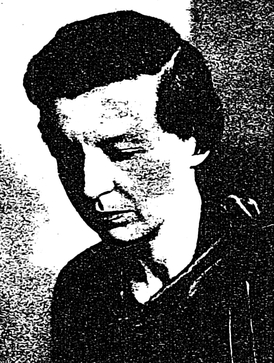Margaret Wilson (novelist) facts for kids
Quick facts for kids
Margaret Wilson
|
|
|---|---|

Wilson c. 1923
|
|
| Born | January 16, 1882 Traer, Iowa, U.S. |
| Died | October 6, 1973 (aged 91) |
| Occupation | Novelist |
| Education | University of Chicago |
| Notable awards | Pulitzer Prize for Fiction (1924) |
Margaret Wilhelmina Wilson (born January 16, 1882 – died October 6, 1973) was an American writer. She wrote many novels. In 1924, she won a special award called the Pulitzer Prize for her book The Able McLaughlins.
Contents
Early Life and Education
Margaret Wilson was born in Traer, Iowa. She grew up on a farm. She went to the University of Chicago and earned degrees in 1903 and 1904.
Her Career as a Writer
After finishing college, Margaret became a missionary. She worked for the United Presbyterian Church of North America. She went to the Punjab region of India. There, she worked at a girls' school and a hospital.
She came back to the U.S. in 1910 because she was sick. She stopped being a missionary in 1916. For a year, she studied at the divinity school at the University of Chicago. Then, she taught at West Pullman High School for five years. During these years, she also took care of her sick father. She started publishing her short stories in magazines like Atlantic Monthly.
What Margaret Wilson Wrote About
Margaret Wilson's stories often talked about important ideas. She wrote about how women were sometimes treated as less important. She also explored the role of religion in people's lives.
In 1923, she won a $2,000 prize from Harper & Brothers. This was a lot of money back then! Before this, her name was not well known. She had signed her stories in Harper's Magazine as "An Elderly Spinster." Her books are interesting because they show how women faced challenges at home. They also showed how the justice system sometimes seemed unfair. She once said she was "the most Middle Western of Middle Westerners." She wrote for women readers, from a woman's point of view.
Stories from India
Two of her novels were inspired by her time in India. She wrote them more than ten years after she returned. She was able to turn her difficult experiences into engaging stories. Daughters of India explored the world of polygamy, which is when one person is married to more than one other person. Trousers of Taffeta focused on a woman's strong desire to have a son.
Life in England and Prison Reform
In 1923, Margaret married George Douglas Turner. He was a Scotsman she had met in India many years before. After they married, she lived in England. Her husband was a tutor at Brasenose College, Oxford. Later, he became the warden of Dartmoor Prison.
Her husband's work with prisons inspired her. She wrote a non-fiction book called The Crime of Punishment (1931). She also wrote two novels about prison life and reform. These were The Dark Duty (1931) and The Valiant Wife (1933). These books were exciting stories that explored the challenges of running a prison. They also looked at ideas about how to make prisons better.
A Book for Young Readers
Besides her books for adults, Margaret Wilson also wrote a novel for children. It was called The Devon Treasure Mystery (1939). In this book, two girls and four boys become amateur detectives. They search for a treasure that has been lost for a long time.
Her Published Works
Here are some of the books Margaret Wilson wrote:
Novels for Adults
- The Able McLaughlins (1923)
- The Kenworthys (1925)
- The Painted Room (1926) – This book was a follow-up to The Kenworthys.
- Daughters of India (1928)
- Trousers of Taffeta (1929)
- The Dark Duty (1931)
- The Valiant Wife (1933)
- The Law and the McLaughlins (1936) – This book was a follow-up to The Able McLaughlins.
Novel for Children
- The Devon Treasure Mystery (1939)
Non-fiction Book
- The Crime of Punishment (1931)
 | Ernest Everett Just |
 | Mary Jackson |
 | Emmett Chappelle |
 | Marie Maynard Daly |


